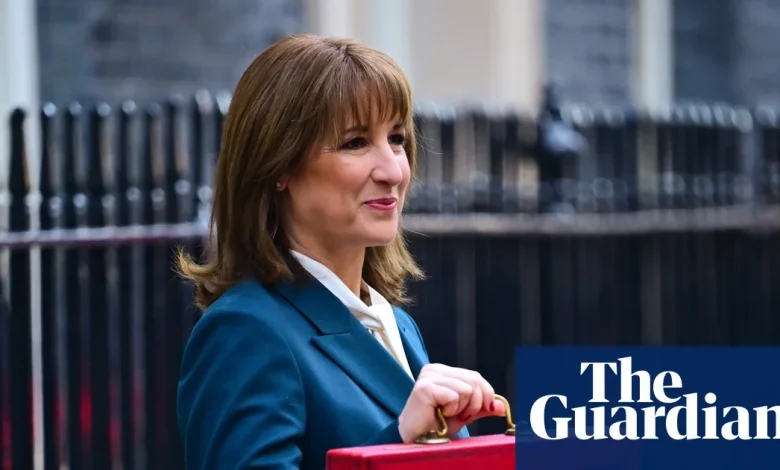Budget 2025: key points at a glance

The chancellor’s opening remarks were somewhat overshadowed by the fact that the Office for Budget Responsibility’s (OBR) assessment of her budget’s impact were accidentally published early, in an unprecedented gaffe that the shadow chancellor, Mel Stride, called “outrageous”.
As she stood at the dispatch box, Reeves opens by saying it was “deeply disappointing” and a “serious error on their part”, meaning the OBR.
“We are rebuilding our economy,” she says, pointing to trade deals with the US, India and the EU, planning reforms, an overhaul of the visa system and a change of fiscal rules to raise public investment to a four-decade high. She once again refers to the £22bn “black hole” in the public finances left by the Conservatives, saying that taxes on the wealthiest have helped close the gap and fund the NHS.
She criticises opponents who think the only good thing the state can do is “get out of the way”.
“Working people demanded and deserved change,” she says. “I said there would be no return to austerity and I meant it … I said I would cut the cost of living and I meant it … I said I would cut debt and borrowing and I meant it.”
Rowena Mason, Whitehall editor: Reeves has mounted a defence of her approach of sticking to her fiscal rules, and opting squarely for tax rises rather than spending cuts to balance the books.
Growth and inflation forecasts
-
The Office for Budget Responsibility (OBR), in a document released early in what appears to be an extraordinary blunder, is predicting growth of 1.5% for this year, up from the 1% it predicted in March. After that, the forecast is for 1.4% next year and 1.5% every year thereafter until 2030. That means that every year from 2026 has been downgraded. Previously, forecasts were for 1.9% in 2026, then hovering between 1.7% and 1.8%.
-
Inflation appears to be running very slightly hotter than predicted in March, coming in at 3.5% this compared with a forecast of 3.2%, then 2.5% in 2026 (up from 2.1%). Thereafter it is as you were, at 2% every year.
RM: The growth figures for this year are relatively positive for the chancellor who fought the election on the basis that Labour would improve national prosperity. However, the years after that are looking worse than expected. Reeves gets round this by saying she expects to beat the forecasts in future.
On top of that, the inflation figures will be a worry as voters are very concerned about the cost of living and rising prices are a very obvious way in which they feel a squeeze on their household finances in daily life. Reeves has repeatedly said she will tackle inflation but the budget does not appear to have many measures to grip this.
Government borrowing
-
Borrowing for 2024-25 has come in at £5.1bn, higher than the March forecast of £4.8bn. After that, forecast borrowing remains higher than the OBR’s March forecast in the short term. For 2025-26 it’s £4.5bn (up from £3.9bn), then £3.5bn (vs £3.1bn)), £3bn (£2.5bn), £2.6bn (£2.3bn), £1.9bn (lower than the March forecast of £2.1bn), and finally £1.9bn in 2030.
RM: Reeves has made reducing borrowing a priority to bring down the amount of debt interest being paid and debt to GDP will fall in every year of the forecast. In keeping with her insistence that she will stick to her financial rules, the chancellor has resisted the calls of those within her party who think she should be borrowing more to invest – in defiance of the jitters of financial markets.
Fuel duty
-
Fuel duty has once again been frozen for another five months at least, until September 2026. The rate has been frozen since 2010-11. After that, a temporary 5p cut to rates introduced in spring 2022 will begin to unwind.
X
Gambling duty
-
Shares in gambling companies plunged even before the chancellor stood up, after the accidental release of Office for Budget Responsibility (OBR) forecasts revealed big rises in online gambling duty, aimed at raising £1.1bn by 2029-30. The figure would be higher, £1.8bn, but the government expects some customers to bet less and admits that others are likely to switch to the illicit market, as the extra duty is passed on to consumers in the form of less attractive bonuses and odds.
-
From April 2026, remote gaming duty (RGD), levied on online casinos, will rise from 21% to 40%, a rise that some in the industry have said will render some businesses unprofitable and cost thousands of jobs. Bingo duty of 10% is abolished.
-
There will be a new online-only rate of general betting duty, which is levied on operators’ income from sports betting. High street bookies will still pay the current rate of 15% but for online, the duty will rise to 25%, with a carve-out for horse racing. Casino gaming duty bands will be frozen.
X





